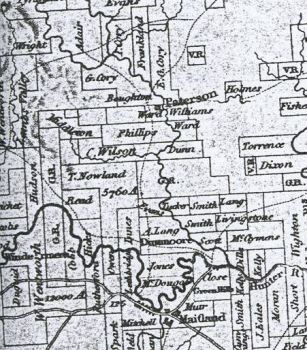Thomas McDougall - Settler
Lorn - Map 2
This land was granted to Thomas McDougall in 1823. Thomas arrived in Australia on the ship Barwell in the autumn of 1798 with his parents Andrew and Elizabeth, brothers John, Andrew and James and sister Elizabeth. Thomas was 10 years old. Also on board the Barwell were the Bowman family who later acquired extensive holdings in the Hunter region.
Initially the McDougalls farmed at Baulkam Hills where in 1799 Andrew senior was given a grant of 150 acres he named Roxburgh Place. Another son, Alexander Waugh McDougall was born to Andrew and Elizabeth in 1800. Andrew senior died in 1824.
Land Grants
In 1823 nine hundred acres was granted to each of the brothers. Thomas named his grant 'Lorn'.
Death of Thomas McDougall
In 1826 Thomas passed away at the age of 35 and his estate passed to his brother John Kerr McDougall who subsequently subdivided it and shared between his brothers and sister. The brothers' other land was in the Singleton (Patrick Plains) area where they farmed sheep. They suffered heavy losses in the drought of 1842.Alexander Waugh McDougall married Mary Jane Fitz on 29 April 1831. They built 'Lorn House' on their share of Thomas' estate. Alexander and Mary Jane had daughters Anne in 1832 and Maria Louisa in 1834, a son Alexander in 1837 and in 1842 and 1847 two more sons followed.
In 1832 Alexander placed a punt on the river at Lorn to ply between his property and Maitland. He was appointed by the Governor to be a member of the first local council for the district of Maitland in 1843
Death of Alexander Waugh McDougall
Alexander Waugh McDougall died in 1888 :-Mr. Alexander Waugh McDougall at his decease was eighty-seven years of age, having been born in April, 1800.
He settled here in 1829, and built close to the river a temporary place of residence. All the present site of Maitland was then covered by a dense cedar brush.
The grant was 900 acres to Thomas McDougall, eldest brother of A. W. McDougall, who never lived on the land, and died without a will, by which his second brother (John Kerr McDougall), as heir-at-law, took the nine hundred acres. He very fairly, and in compliance with what he believed to be his brother's wishes, divided the grant fairly amongst his brothers and one sister.
At the start A. W. McDougall had no one to assist him except Government men. He burnt a kiln of bricks close to the place where the punt was afterwards established, and cut the cedar and other timber for his future residence out of the Brush. After which Mr. and Mrs. McDougall rode over to the farm here from Windsor, and after some time he commenced the present building, which has been the family residence ever since.
Mr. McDougall was made a magistrate some time in the forties. He was celebrated in the early days as a good manager of his men, and contrasted most favourably with others, who had an unenviable notoriety as flogging masters. He never had his men flogged, but, if they were not manageable by fair means, he sent them back to the Barracks.
After the residence was built he began to plant an orchard and orangery for the use of the family, and as the years rolled on, finding the utility and probable income to be derived from it, he gradually enlarged it. The whole is now about fourteen acres. Mr. McDougall's share of the grant was 200 acres, out of which very little has been sold.
He experienced the bad times in 1840, and endeavoured to sell part of the land then adjoining the Punt Road, and now occupied by Mr. H. L. McDougall as town lots ; but only one was sold, which was afterwards swept into the river.
At the time of Mr. McDougall's settling down, here, there was a very large camp of blacks on a high bank of the river, covered with gum trees at Nilho ; and, although they were not troublesome to the whites, hostile bands frequently met and fought on the gravelly beach below Mrs. Risby's Hotel, where there was then a ford across the river. The local tribe was evidently attracted to the spot by the abundance of game in the scrub or brush, and by the fish in the river. And, as the clearings became larger and game scarcer, Mr. McDougall was one of those who was a continual and kindly helper to the blacks in providing them with food.
Besides the farm at Lorn, Mr. McDougall owned a large estate at Singleton, now occupied by Dr. White, which was sacrificed to meet his difficulties incurred in the disastrous droughts and depression in 1840 and the following years. He also held a share in the celebrated Piallaway Station on Liverpool Plains, and as the great value of properties of that character began to be seen, he sold out his rights, and it is now the property of a large pastoral company, who value it at three pounds an acre for the secured land. It was and is one of the finest grazing estates that this colony can produce.
Mr. McDougall, in his great experience saw the time when the Hunter at West Maitland was merely a chain of waterholes, and yet again saw a schooner built above the falls towed down the river by the old deep channel when in fresh.
Mr. McDougall though truly one of the pioneers, and entitled to be heard on all matters from his keen common sense, and his probity, was a retiring and unambitious man, but was always ready to when his counsel or advice was sought.
As one of the mourners at his grave said 'Ah, well, there's another of the good old sort gone.' (Maitland Mercury 31 January 1888)
↑
